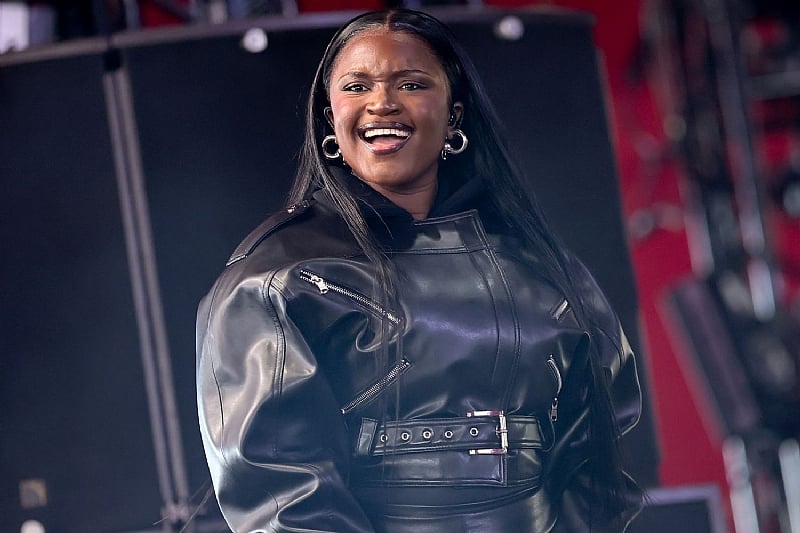Amaarae’s 2024 Coachella performance, a dazzling display of gold-glossed braids, distinctive sunglasses, and a vibrant Ghanaian-inspired bodysuit, transcended mere entertainment; it signaled a paradigm shift in Ghanaian music. This shift moves away from mimicking Western trends and embraces innovation grounded in the rich tapestry of local sonic traditions. Her upcoming second studio album, Black Star, slated for release on August 8, 2025, promises to cement her position at the confluence of highlife heritage, futuristic club sounds, and global pop influences. Building on the success of her genre-bending anthem “S.M.O.”, a track infused with echoes of 1980s Ghanaian highlife, Amaarae isn’t just releasing an album; she’s curating a cultural moment, one that redefines Ghanaian music on the global stage.
Amaarae’s Coachella performance, where she captivated audiences initially drawn to headliner Burna Boy, epitomized a new Ghanaian ethos: bold, transgressive, and undeniably exportable. Her voice, a blend of whispered intimacy and rebellious undertones, combined with her disruptive yet rhythmic delivery, captivated the crowd. In an interview with Pitchfork, she articulated her vision for Black Star: “I want it to be the sound of the future that remembers the past.” This statement encapsulates her ambition to showcase the multifaceted nature of Ghanaian music, transcending the limiting label of Afrobeats to encompass punk, synth, highlife, and a unique brand of “weirdness” she celebrates as beautiful. This ambition positions her as a leading figure in a movement pushing the boundaries of Ghanaian music and its global perception.
“S.M.O.”, the lead single from Black Star, serves as a sonic microcosm of Amaarae’s multifaceted artistry. The track intricately weaves together vintage highlife guitar riffs, warped synth pads, and a minimalist drum kit, creating a compelling fusion of classic Ghanaian rhythms and futuristic sonic textures. The accompanying visual aesthetic, stark, surreal, and unapologetically queer, draws parallels with iconic boundary-pushers like Grace Jones and Fela Kuti. Industry analysts, as reported in the Accra Street Journal and SKB Journal, have hailed the track as “a masterclass in diasporic sonic engineering.” Beyond its technical brilliance, “S.M.O.” challenges the often over-commercialized narrative of African pop, demanding that Ghanaian music export not only sound but also ideas—about gender, fashion, political resistance, and cultural authenticity.
The reception to Amaarae’s work in her native Ghana, from the upscale lounges of Labone to the creative hubs of Osu, is a complex mix of celebration and critique. While some established industry figures grapple with her androgynous style and avant-garde approach, she is revered as a creative oracle by the city’s Gen Z creatives. Music journalist and curator Ewura Quaye describes her as “the closest we have to a Beyoncé-meets-Erykah Badu hybrid, but Ghanaian,” highlighting her unique blend of pop sensibility and artistic depth. Quaye further emphasizes Amaarae’s unapologetic self-expression, a trait that both unsettles some and empowers many, solidifying her influence on a generation seeking new forms of artistic representation.
The album’s title, Black Star, is a deliberate echo of Ghana’s national symbol, reflecting Amaarae’s broader mission: to reposition Ghana not merely as the birthplace of highlife or a subgenre of Afrobeats, but as a leading voice in global experimental pop. Featuring rumored collaborations with artists like Rosalía, Ayra Starr, and Tyler, the Creator, Black Star is poised to challenge not only genre conventions but also geopolitical boundaries surrounding the definition of “African music.” This collaborative approach further underscores Amaarae’s commitment to expanding the sonic landscape and creating a truly global conversation around music.
As the August release of Black Star approaches, the anticipation revolves not around its potential chart success, which seems almost assured, but around its impact on the narrative surrounding Ghanaian music. Amaarae’s artistry transcends nostalgia and trend-chasing; it is deeply intentional, drawing inspiration from the past to craft a soundscape that is both undeniably contemporary and distinctly Ghanaian. In a global music landscape yearning for authenticity, Black Star has the potential to be Ghana’s most radical cultural export in years, a testament to Amaarae’s unique vision and her ability to weave together tradition and innovation in a way that resonates deeply with a global audience.


